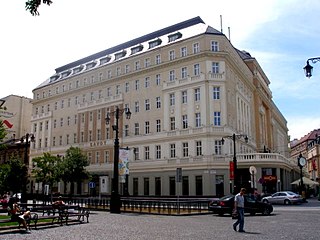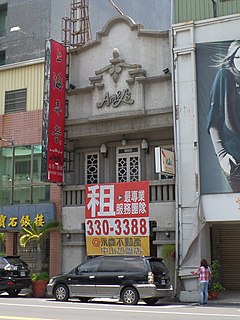
Lodging refers to the use of a short-term dwelling, usually by renting the living space or sometimes through some other arrangement. People who travel and stay away from home for more than a day need lodging for sleep, rest, food, safety, shelter from cold temperatures or rain, storage of luggage and access to common household functions. Lodging is a form of the sharing economy.

Renting, also known as hiring or letting, is an agreement where a payment is made for the temporary use of a good, service or property owned by another. A gross lease is when the tenant pays a flat rental amount and the landlord pays for all property charges regularly incurred by the ownership. An example of renting is equipment rental. Renting can be an example of the sharing economy.

A landlord is the owner of a house, apartment, condominium, land, or real estate which is rented or leased to an individual or business, who is called a tenant. When a juristic person is in this position, the term landlord is used. Other terms include lessor and owner. The term landlady may be used for the female owners. The manager of a pub in the United Kingdom, strictly speaking a licensed victualler, is referred to as the landlord/landlady. In political economy it refers to the owner of natural resources alone from which an economic rent is the income received.

A lease is a contractual arrangement calling for the user to pay the owner for the use of an asset. Property, buildings and vehicles are common assets that are leased. Industrial or business equipment are also leased. Basically a lease agreement is a contract between two parties: the lessor and the lessee. The lessor is the legal owner of the asset, while the lessee obtains the right to use the asset in return for regular rental payments. The lessee also agrees to abide by various conditions regarding their use of the property or equipment. For example, a person leasing a car may agree to the condition that the car will only be used for personal use.

A timeshare is a property with a divided form of ownership or use rights. These properties are typically resort condominium units, in which multiple parties hold rights to use the property, and each owner of the same accommodation is allotted their period of time. Units may be sold as a partial ownership, lease, or "right to use", in which case the latter holds no claim to ownership of the property. The ownership of timeshare programs is varied, and has been changing over the decades.

A Lease-Purchase Contract, also known as a Lease Purchase Agreement, is the heart of rent-to-own properties. It combines elements of a traditional rental agreement with an exclusive right of first refusal option for later purchase on the home. It is a shortened name for Lease with Option to Purchase Contract.
A property manager or estate manager is a person or firm charged with operating a real estate property for a fee when the owner is unable to attend to such details personally or is not interested in doing so. The property may be individual title owned or owned under the sectional title, share block company owned, and may be registered for residential, commercial office, and retail or industrial use. In 2006, the Bureau of Labor Statistics Office of Occupational Statistics reported that there were 329,000 property managers employed in the United States, with the number expected to grow to by 50,000 by 2016.
A rental agreement is a contract of rental, usually written, between the owner of a property and a renter who desires to have temporary possession of the property; it is distinguished from a lease, which is more typically for a fixed term. As a minimum, the agreement identifies the parties, the property, the term of the rental, and the amount of rent for the term. The owner of the property may be referred to as the lessor and the renter as the lessee.

A vacation rental is the renting out of a furnished apartment, house, or professionally managed resort-condominium complex on a temporary basis to tourists as an alternative to a hotel. The term vacation rental is mainly used in the US. Other terms used are self-catering rentals, holiday homes, holiday lets, cottage holidays and gites.
Flipping is a term used to describe purchasing a revenue-generating asset and quickly reselling it for profit.

Rent-to-own, also known as rental purchase or rent-to-buy, is a type of legally documented transaction under which tangible property, such as furniture, consumer electronics, motor vehicles, home appliances, real property, and engagement rings, is leased in exchange for a weekly or monthly payment, with the option to purchase at some point during the agreement.
In the United States, a mortgage note is a promissory note secured by a specified mortgage loan.
Leaseback, short for "sale-and-leaseback", is a financial transaction in which one sells an asset and leases it back for the long term; therefore, one continues to be able to use the asset but no longer owns it. The transaction is generally done for fixed assets, notably real estate, as well as for durable and capital goods such as airplanes and trains. The concept can also be applied by national governments to territorial assets; prior to the Falklands War, the government of the United Kingdom proposed a leaseback arrangement whereby the Falklands Islands would be transferred to Argentina, with a 99-year leaseback period, and a similar arrangement, also for 99 years, had been in place prior to the handover of Hong Kong to mainland China. Leaseback arrangements are usually employed because they confer financing, accounting or taxation benefits.

A retail kiosk is a store operated out of a merchant-supplied kiosk of varying size and shapes, which is typically enclosed with the operator located in the center and customers approaching the vendor across a counter.

Income Property is a Canadian home-improvement program hosted by Scott McGillivray. The series premiered on HGTV Canada on September 29, 2008, and on January 1, 2009, on HGTV in the U.S. The program was a half-hour long for the first six seasons, and then expanded to an hour-long format starting with season 7. The show reverted to its half-hour format with the start of season 10.
HomeAway was a vacation rental marketplace. It operated through 50 websites in 23 languages through which it offered rentals of cabins, condos, castles, villas, barns, and farmhouses.
For United States commercial real estate, normally the landlord, rather than the tenant, is responsible for real estate taxes, maintenance, and insurance. In a "net lease," in addition to base rent, the tenant or lessee is responsible for paying, some or all of the recoverable expenses related to real-estate ownership. As the rent collected under a net lease is "net" after expenses are passed through to tenants to be paid, the base rent tends to be lower than rent charged under a gross lease.
FlipKey is an online vacation rental marketplace. It is a subsidiary of TripAdvisor. In 2016 the company listed more than 300,000 properties in 179 countries. Its headquarters is in Boston, Massachusetts, United States.
CanadaStays is a Canadian online marketplace for short-term vacation rental properties, with over 250,000 cottages, cabins, chalets and condos available to rent across Canada, the US, the Caribbean, Mexico and South America. Founded in Toronto in 2008, CanadaStays has since become Canada's largest vacation rental marketplace, with over $24MM in bookings reported in 2017.
Vrbo is an American vacation rental online marketplace originally known as Vacation Rentals by Owner or VRBO. It was acquired by HomeAway in 2006. Expedia Group acquired HomeAway in December 2015. In March 2019, VRBO was re-branded Vrbo, including a new logo, capitalization, and pronunciation. In July 2020, the HomeAway and Vrbo websites became a single Vrbo website.








